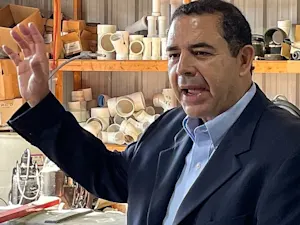
Hegseth Divides Military With Christian Nationalism
Defense Secretary Pete Hegseth is turning the Pentagon into a pulpit, and his faith-fueled approach is sparking fierce debate across the US military. Known for his outspoken Christian nationalist views, Hegseth has reportedly infused recruitment campaigns with biblical themes, hosted prayer services within the Pentagon walls, and publicly aligned himself with a pastor who controversially questions women's right to vote. This blend of religion and military service is dividing troops and raising urgent questions about the values that should guide America's armed forces.
A Military Recruitment Campaign With a Religious Message
According to The Guardian, recent Pentagon recruitment ads feature soldiers in full tactical gear parachuting into desert landscapes reminiscent of the Middle East, accompanied by text and imagery inspired by biblical themes. The campaign closes with a message emphasizing the nation's identity as one under God, reflecting Hegseth's personal zeal to bring his ultra-conservative brand of Christianity into the military's public face. Veterans and active-duty personnel alike have expressed concern that this religious messaging is alienating service members who do not share these beliefs. Mike Pruitt, a Navy veteran and congressional candidate, described the secretary's approach as sowing discord among the ranks, warning that politicizing the military's role is causing frustration among troops who see their duty as apolitical.
Prayer Services and Pastoral Influence at the Pentagon
Hegseth's faith-driven agenda extends beyond recruitment ads. He has hosted multiple Christian prayer services inside the Pentagon during working hours, inviting his personal pastor, Brooks Potteiger, to lead these gatherings, according to the Associated Press. Invitations to these events were reportedly sent through official government emails to Defense Department employees and service members, signaling an unprecedented blending of religious practice and military administration.
This move has raised eyebrows among those who believe the military should remain a secular institution, serving a diverse population of Americans. Critics argue that such religious displays risk alienating non-Christian service members and undermine the constitutional principle of separation of church and state.
Aligning With Controversial Christian Nationalist Leaders
Perhaps the most contentious aspect of Hegseth's tenure is his public association with Pastor Doug Wilson, co-founder of the Communion of Reformed Evangelical Churches (CREC). According to the Associated Press, Wilson's church network is known for its archconservative theology, including the belief that women should not have the right to vote — a stance Wilson himself has defended, though he admits it is not a top priority to repeal the 19th Amendment.
Hegseth reposted a CNN segment highlighting Wilson's views, accompanied by the slogan "All of Christ for All of Life," which reflects the idea that Christianity should influence every aspect of society, including government. Pentagon spokesman Sean Parnell confirmed Hegseth's appreciation for "many of Mr. Wilson's writings and teachings," underscoring the depth of this ideological alignment.
The Christian Reconstructionist Influence
The CREC network reportedly adheres to a strict Reformed theology rooted in the teachings of John Calvin and influenced by Christian Reconstructionism — a movement advocating for a society governed by biblical law. This theological framework envisions a muscular government promoting traditional morality and Christian values across all spheres of life.
Doug Wilson's ministry, which includes educational institutions and a publishing arm, promotes books such as "The Case for Christian Nationalism" and "It's Good to Be a Man: A Handbook for Godly Masculinity." These materials reflect a worldview that blends patriotism with a desire to see America redefined as a Christian nation.
Divisions Within the Ranks and the Broader Military Community
The infusion of Christian nationalist ideology into the Pentagon has not gone unnoticed by service members. Veterans and active-duty troops have reportedly reached out to watchdog groups investigating extremism in the military, expressing concern about the growing influence of religious nationalism. Kristofer Goldsmith, CEO of the nonprofit Task Force Butler, reported an increase in messages from troops seeking ways to push back against what they see as a threat to democratic values within the military.
"Every time Hegseth does one of these things, I'm getting messages from active duty troops, reaching out to me more and more, saying 'How do I get involved?',” said Goldsmith, referring to the work his organization does to investigate extremism in the ranks. He continued, "We've got active-duty troops who recognize that the military they're serving in, has become a threat to democracy," as reported by The Guardian.
Critics warn that this trend could lead to a surge of recruits motivated more by religious zeal than by a commitment to constitutional service. Such recruits may struggle to perform effectively or, worse, rise to leadership positions and propagate divisive ideologies, potentially weakening the military's cohesion and readiness for years to come.
The Constitutional Question: Who Belongs in the Military?
At the heart of the controversy is a fundamental question: What values should guide the US military? The armed forces are sworn to uphold the Constitution, which guarantees freedom of religion and prohibits religious tests for public office or service. Yet, Hegseth's actions suggest a preference for a military culture steeped in a particular religious worldview.
Some critics argue that embracing Christian nationalism within the military undermines the pluralistic nature of American society and risks alienating service members of different faiths or none at all. Others contend that faith has always played a role in the military's history and that Hegseth is simply restoring a sense of moral clarity and purpose.
Allegations and Controversies
Hegseth's personal views on women and feminism have drawn criticism. According to the Associated Press, He has previously questioned women serving in combat roles and faced sexual assault allegations, for which no charges were filed. Additionally, critics and some veterans allege that under Hegseth's leadership, senior female service members and officers of color have been fired and that thousands of transgender troops have been removed, all part of a broader effort to end policies described by some as "woke" in the military, as reported by The Guardian. These claims remain unverified by official Pentagon sources and are attributed to critics and veterans.
Official Responses and Public Alarm
The Pentagon has remained largely silent on the controversy surrounding its recruitment ads and religious activities. When pressed, spokesman Sean Parnell acknowledged Hegseth's church affiliation and his appreciation for Pastor Wilson's teachings but declined to comment on the broader implications of these developments.
Meanwhile, public alarm is growing. Some lawmakers and military leaders worry that the Pentagon's embrace of Christian nationalism could deepen divisions within the ranks and erode trust in the military as a neutral institution. Critics also express concern that this approach risks alienating non-Christian service members and challenges constitutional principles, emphasizing the need for the military to remain an inclusive institution serving all Americans equally.
The Road Ahead: Balancing Faith and Duty
Defense Secretary Pete Hegseth's tenure is a flashpoint in the ongoing debate over the role of religion in public life and the military. His faith-fueled approach has energized some but alienated many others, exposing fault lines that could have lasting consequences for the US armed forces.
As the military grapples with recruitment challenges and evolving social dynamics, the question remains: Can the Pentagon reconcile Hegseth's vision of a Christian nationalist military with its constitutional mandate to serve all Americans equally? The answer will shape the future of the military and its place in American society for years to come.
References: How Pete Hegseth's zeal to bring religiosity to the Pentagon is dividing the military | Pete Hegseth | Pentagon's Hegseth part of archconservative church network CREC | Hegseth reposts video featuring pastors opposing women's right to vote






















